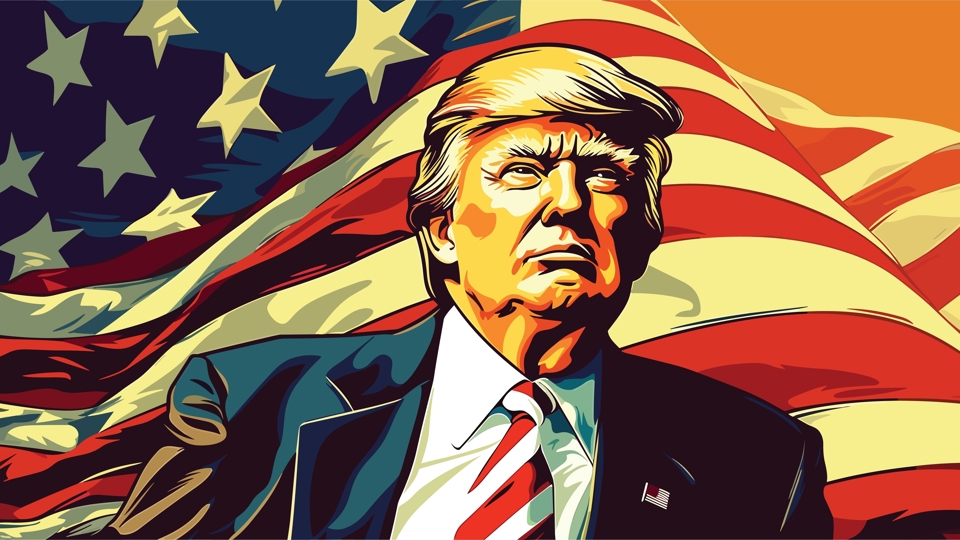Trump’s ‘beautiful’ tariffs – helping clients navigate ‘The Donald’s’ brand of diplomacy

Peter Ranscombe finds out how Scotland’s corporate lawyers are adapting their advice to cope with Trump 2.0.
“It’s the most boring maxim – ‘businesses hate uncertainty’ – but it’s a maxim because it’s true,” points out Brian Moore, a corporate partner in Dentons’ Edinburgh office and a long-standing adviser to whisky distillers. “The way in which tariffs have been announced and imposed creates uncertainty and means that companies are planning for a range of different scenarios.”
Uncertainty has certainly been the name of the game since US President Donald Trump returned to the White House in January. Trump’s announcement of tariffs during his speech in the Rose Garden back in April – with his famous giant cardboard league tables – sent shockwaves through the Scotch whisky industry, along with other sectors of Scotland’s economy.
The threat of tariffs stung producers of Scotland’s national drink due to their sense of deja vu. Between 2019 and 2021, a 25% tariff was slapped on single malt Scotch whisky during a wider trade war between the US and Europe centred on aircraft manufacturers Airbus and Boeing.
During those 18 months, Scottish distilleries lost more than £600 million in exports. Many companies report that they have not recovered the ground lost to rivals from Ireland, Japan and the US itself, which capitalised on the higher price of Scotch single malts in order to grow their own market shares.
Questions over contracts and cash
While Trump promised to look at whisky tariffs during his visit to Scotland in July of this year, the uncertainty is weighing on spirits companies, with lawyers adjusting their advice since ‘The Donald’ returned to the Oval Office. “I’m advising clients to be nimble in relation to a couple of areas,” explains Brian.
“One is their contractual arrangements with counterparties, such as distributors in the States, which they’re looking at with a much closer eye than they would have before. For example, would the introduction of tariffs trigger force majeure clauses with distributors and lead to price renegotiations?”
Brian adds: “The second area that we’re talking to clients about a lot is cash, particularly if they’re trading in dollars. Lawyers and accountants are helping them to understand the tax implications of setting up entities with bank accounts in the States in order to receive money from customers and pay suppliers – especially bourbon barrel dealers – rather than being hit by exchange rate fluctuations by bringing money straight back to the UK.”
‘There are no winners in a trade war’
Scotland’s business representative bodies emphasise the importance of exports to the nation’s economy. Michelle Ferguson, director of CBI Scotland, says: “Scottish businesses have been clear; there are no winners in a trade war.
“Looking outward and being open is a strength for local firms, particularly with the value of Scotland’s international goods exports totalling more than £36 billion a year. The recent announcements of UK trade deals with both the US and India sends a clear message to the international community that this country is a fierce advocate of free and fair trade and a reliable partner to do business with.”
Liz Cameron, chief executive at the Scottish Chambers of Commerce, adds: “There is no doubt that 10% tariffs from the US on most UK goods are very damaging for our businesses and economy. The tariffs are particularly disappointing given that the US is Scotland’s largest export destination.
“While we understand trade negotiations are almost always challenging and drawn out, we urge the UK and Scottish governments to continue engaging proactively with US representatives in steps towards agreeing a comprehensive UK–US trade agreement, which delivers for businesses and consumers.”
Pharmaceuticals industry holds its breath
While Prime Minister Sir Keir Starmer’s government continues to flesh out the details of the deal reached with the US on tariffs, one important Scottish industry is still waiting for news – life sciences. An investigation into pharmaceuticals under Section 232 of the US Trade Expansion Act of 1962 is due to run until December.
Liam McMonagle, a commercial law partner at Thorntons, highlights the importance of the US market. “Most life sciences businesses in Scotland have a global outlook – there’s no point going through the immense amount of blood, sweat and tears to develop drugs or medical devices if you’re only supplying them in Scotland, the UK or even Europe,” he says.
“As advisers, we’re trying to help clients understand and manage the risks of buying and selling internationally, which has suddenly become fluid and uncertain. The position that the Trump administration ultimately lands on in relation to tariffs on pharmaceuticals is currently under discussion.
“It would appear that the UK Government has maintained a good relationship with the Trump administration. What that actually means in terms of whether there will be any specifically advantageous treatment for UK businesses in terms of their access to the American market, or the extent to which tariffs operate as a barrier to that, is yet to be fully seen.”
Liam adds: “When you’re advising clients on contracts that may cover three or five years, you need to take this uncertainty into account. The lesson that we’ve learned over the past 10 years since the Brexit vote is just how much things can change.”
More risks involved in entering the US
Tariffs aren’t the only issue since Trump’s return to the White House. Olivia McLaren, head of US immigration at Burness Paull, is keeping a close eye on clients’ abilities to move in and out of the country.
“I’m getting a lot more inquiries than I did during the previous administration from people who are just worried about whether they’re at risk of being stopped at the border when, in the past, they wouldn’t have thought twice about it,” she explains.
“Even before people go, the US embassy in London is now refusing point-blank to process visitor visa applications for anyone with a criminal record, even an arrest without a charge or conviction – in the past, even if people were statutorily ineligible, they may have been granted a waiver.
“I haven’t had anyone who was planning to enter the market who has decided to stop because of this. But I’ve had people who have needed to make adjustments to the type of visa they plan to pursue and the timescales for their strategies.”







